The death has taken place on Sunday, 3 April 2016, of Fr James Joseph Higgins SMA, MFR, at the SMA House, Blackrock Road, Cork.
Fr Higgins was in failing health for some time and died peacefully in his room at 12.45am.
James Joseph Higgins was born in Collooney, Co Sligo, the youngest child of Alphonsus and Mary [née Harte] on 8 February 1924. His mother sadly died six months later on 24 August.
Partly reared by his aunts, Father Jimmy attended Camphill National School where he was greatly influenced by the Headmaster, Henry Rooney, (kind, sympathetic but stern and he often warmed our hands with a hazel rod when we missed an answer) who instilled in him a great love of Irish history. On leaving primary school he was persuaded to join the SMA, by the local curate Fr. Jim Shyrane (‘a most unique man’) who had a special interest in the SMA College, Ballinafad. He subsequently attended an interview at the Convent of Mercy which was conducted by Frank McNamara, SMA. He assumed he had passed the interview when he was asked to turn up at SMA Sacred Heart College, Ballinfad (referred to as an Apostolic School and a place of special formation for the priesthood) in September, 1937 to begin his secondary school studies. He completed his Inter Cert there before moving in September, 1940 to SMA College, Wilton, Cork, another Apostolic School, where he completed his secondary education in 1943.
 In 1943 he moved to the African Missions College, Cloughballymore, Co. Galway to being in earnest his studies for the priesthood. It was a 21-month course in spiritual training and guidance at the end of which, 1 July 1945, he became a temporary member of the Society of African Missions. A classmate of his was the late Larry Mullen whose son, Larry Junior, is a member of the rock group, U2. In September, 1945, Jimmy began his theology studies at the SMA Major Seminary at Dromantine, Co. Down.
In 1943 he moved to the African Missions College, Cloughballymore, Co. Galway to being in earnest his studies for the priesthood. It was a 21-month course in spiritual training and guidance at the end of which, 1 July 1945, he became a temporary member of the Society of African Missions. A classmate of his was the late Larry Mullen whose son, Larry Junior, is a member of the rock group, U2. In September, 1945, Jimmy began his theology studies at the SMA Major Seminary at Dromantine, Co. Down.
1949 Ordination class
Front row, left to right: James Higgins, Patrick Jennings, Eugene Connolly, John Cantillon and Cornelius O’Driscoll.
Back row, left to right: Thomas Devane, Eugene Melody, John Rodgers and William Breslin.
The course in Dromantine lasted four years and in Jimmy’s words ‘the years glided by silently, swiftly and peacefully, as the day all Seminarians looked forward to with hopeful anticipation was approaching’. However, his time in Dromantine was also marked by tragedy and sadness when he was called from the study hall on the morning of 5 March, 1947, to be told that his father had died. 1947 in Ireland was the year of the great snow and Jimmy recounts in detail the torturous journey by train back home to attend his father’s funeral. A few days after the funeral he returned to Dromantine and he recalls that the remaining two years of his studies went very rapidly. He took the Permanent Oath of membership 11 June 1948 and was ordained, along with seven classmates, on 14 June, 1949, at St. Colman’s Cathedral, Newry, Co. Down. Fr Paddy Jennings is the sole remaining living member of that class, living in Blackrock Road.
Following his ordination Fr Jimmy was asked to return to University and study for a Higher Diploma in Education, in order to be part of the large band of SMA missionaries involved in the teaching apostolate in Africa.
Fr Jimmy arrived in Apapa, Nigeria on 5 December 1950. After one night he headed, via Abeokuta and Akure to St. Thomas’ Teacher Training College, Ibusa which was to be his home for the next five years. He began his missionary career as a teacher at St. Thomas’ in January, 1951.
When he returned to Nigeria from his first leave in 1956 he was asked to relieve Fr. Michael Grace as Principal at Assumption Teacher Training College, Uzairue. His stint as Principal in Uzairue lasted for 10 years until the College was closed by the Nigerian Government in 1966. A feature of his time in Uzairue was the great opportunity provided to do ‘proper missionary work’, visiting the ‘bush’ at weekends and during the holidays. The Government decided to close it down in 1966 along with many other Teacher Training Colleges.
 Around the same time a vacancy emerged at St. John Bosco’s, Ubiaja. It had also been closed down two years previously as a Teacher Training College and it was re-opened as a Commercial Secondary School under Fr. Paddy Gantly, SMA. ‘I went home on leave in June 1973 from St. John Bosco’s and fully expected to get appointed to parish work on my return.’
Around the same time a vacancy emerged at St. John Bosco’s, Ubiaja. It had also been closed down two years previously as a Teacher Training College and it was re-opened as a Commercial Secondary School under Fr. Paddy Gantly, SMA. ‘I went home on leave in June 1973 from St. John Bosco’s and fully expected to get appointed to parish work on my return.’
SMAs brothers, priests and seminarians gather for Fr Jimmy’s Golden Jubilee in 1999, at the SMA Regional House, Ibadan
Front row: left to right: Donall Ó’Cáthain, Damian Bresnahan, Paddy Whelan, Nestor Nongo-Aziagbia [SMA seminarian and is now the Bishop of Bossangoa, Central African Republic], Dan Murphy, Martin O’Farrell (Acting Regional Superior), Jimmy Higgins, Seán Ryan, Jean-Baptiste Traoré [SMA seminarian now an SMA priest], Jim O’Hea, and two SMA seminarians and now priests Anemon Guy SMA and Alain Mokopamé [now a priest of Mbaiki diocese, CAR].
In the second and third rows, left to right, Eddie Hartnett, Michael O’Leary, Richard Wall, John O’Hea, Val Hynes, Jack Casey, Gianpiero Conti, Fabian Hevi, Francois Gnonhossou, Evantus Kene [all have since been ordained as SMA priests, and one of them – Francois Gnonhossou – is now the Bishop of Dassa-Zoumé, Benin Republic], Phonsie Flatley, Br Tom Fitzgerald, Tim Cullinane, Fintan Daly, Alberto Olivoni, Noel O’Leary, SMA seminarian and now priest Emmanuel Andoh, Andy O’Sullivan, Tim Carroll [later Vicar Apostolic of Kontagora, Nigeria], Angelo Besenzoni, Mattie O’Connell, Mick Cahill, Antonio Porcellato, Danny Monaghan and Ali Kelly.
However, on return from leave he was surprised to be appointed Principal of St. Joseph’s Teacher Training College, Ozoro in the Delta Province and somewhat reluctantly he began work there in November, 1973. Jimmy was still happy to be back in Teacher Training again. While he very much enjoyed his first few years there, the atmosphere in the schools was becoming more and more secular and examination malpractice was rearing its head. In addition, there was a general breakdown in discipline and ‘I began to feel my days in education were numbered. I went home on leave in 1981 and decided to take a Sabbatical back in Ireland. I wrote my resignation to the Ministry in Benin and it was accepted’. However, during his Sabbatical in Maynooth College in November, 1981 he was asked by SMA Provincial, Fr. Con Murphy to consider a request from Bishop Edmund Fitzgibbon, Administrator of Warri Diocese, that he take up an appointment as Parish Priest at St. Patrick’s, Sapele. He accepted the appointment and he broke his Sabbatical in December, 1981 to return to Warri Diocese. His time in Sapele lasted for thirteen years.
He was recognized nationally on 20 February, 1982 when he was awarded the M.F.R., Member of the Order of the Federal Republic of Nigeria, in recognition of his contribution to education in Nigeria. The award was conferred by His Excellency, President Alhaji Sheju Shagari.
 During his years in Nigeria, Fr Jimmy was also entrusted with Society responsibilities including representing his brother SMAs at the 1973 and 1983 Irish Provincial Assemblies and serving as Society Superior in Warri from 1983-1989.
During his years in Nigeria, Fr Jimmy was also entrusted with Society responsibilities including representing his brother SMAs at the 1973 and 1983 Irish Provincial Assemblies and serving as Society Superior in Warri from 1983-1989.
Centenary of the presence of the Catholic Church in Issele-Uku, October 1988
Front row, left to right: Edward Deeney, Michael Boyle, Bishop Albert Fasina (Ijebu Ode diocese), Patrick J. Harrington (SMA Superior General), Bishop Anthony Gbugi (Issele-Uku diocese), Michael Grace and James Higgins.
Back Row, left to right: Maurice Maguire, John (Jack) Ryan, Jeremiah (Jerry) Cadogan, William (Bill) Power, Thomas Curran and Vincent Boyle.
After thirteen active and enjoyable years in St. Patrick’s, Sapele, the SMA authorities requested him to take over the SMA House in Uromi. He moved there in April, 1994. However, in November 1994, he was asked to take up a pastoral appointment at St. Patrick’s SMA parish, Cable Point, Asaba [in the diocese of Issele-Uku]where he remained until May, 2000 when he moved back to Uromi to enjoy his ‘retirement’. It was during these years in Uromi that he put pen to paper and wrote his first book – ‘Kindling the Fire’ – published in 2003, a profile of 210 SMA missionaries who laboured in Mid-West Nigeria from 1884 – 2003, and he followed this up with his second book – ‘The Pilgrim Soul in Me’ – published in 2004, comprising Part 1 which describes the years leading up to his ordination in 1949 and Part 2 which describes fifty-four years spent as a missionary in Nigeria. He returned to St. Patrick’s, Cable Point again in 2005 where he was a valued member of the Pastoral team led by Fr. Joseph Chege, SMA, Fr. Eric Yapi Yapi, SMA and Fr. Noel Musa, SMA until 2010 when he left for Ireland on annual leave.
It was then that he was diagnosed with a serious illness which made it impossible for him to return to Nigeria, though that would have been his wish if the doctors had allowed. And so began his years of retirement in the African Missions House, Blackrock Road, Cork, where he died on Divine Mercy Sunday, 3 April 2016.
Earlier this year, when asked if he would like to go back to Nigeria, his reply: “I’d go in a heartbeat.” After Collooney, Nigeria was his second and beloved home.It was during this leave that he was diagnosed with a serious illness and he never returned to his beloved Nigeria. This brought to a close sixty wonderful years as a missionary in Nigeria.
Throughout his thirty years teaching and the latter part of his time in the pastoral ministry he has been blessed with remarkably good health and can only remember two bouts of malaria fever during all those years. “I rarely used a mosquito net except when they were very voracious. I was blessed with a fairly cool temperament and I’m not the worrying type. I try to see the silver lining even when it isn’t there. A simple diet combined with a sense of humour helped to keep serious sickness at bay”.
 Most of the above is taken from an Appreciation written by Fr Peter McCawille SMA on the occasion of Fr Jimmy’s 60th Ordination anniversary, in 2009, which was celebrated in St Patrick’s, Asaba. The quotations come from Fr Higgins two works [Kindling the Fire, The Pilgrim Soul in me] and Fr McCawille ended his Appreciation with the following lines, “We compliment Jim, on his youthful appearance, his gracious spirit and his perennial good humour. We rejoice with him on this special occasion and we extend to him our heartiest congratulations on reaching this momentous milestone in his life.”
Most of the above is taken from an Appreciation written by Fr Peter McCawille SMA on the occasion of Fr Jimmy’s 60th Ordination anniversary, in 2009, which was celebrated in St Patrick’s, Asaba. The quotations come from Fr Higgins two works [Kindling the Fire, The Pilgrim Soul in me] and Fr McCawille ended his Appreciation with the following lines, “We compliment Jim, on his youthful appearance, his gracious spirit and his perennial good humour. We rejoice with him on this special occasion and we extend to him our heartiest congratulations on reaching this momentous milestone in his life.”
One of the last photos of Fr Higgins in Asaba in 2010.
Shortly before celebrating his 60th Ordination anniversary he was awarded the Papal honour – Pro Ecclesia et Pontifice – by Pope Benedict XVI, at the request of the Bishop of Warri for his meritorious service in that diocese during a particular time of turbulence. Sadly, Fr Jimmy had left Nigeria before the medal and parchment arrived but it was found among his personal effects after his death. In typical fashion, both his awards were put away in a drawer without fanfare.
Fr Jim was predeceased by his sister Clare [Martin] in 1963 and his brother Charlie in 1998. His SMA confreres, at home and in Africa, join his nieces, nephews, cousins, other relatives and friends, as well as the People of God, clergy and lay, in the Archdiocese of Benin City and the dioceses of Warri, Issele-Uku and Uromi in mourning this devoted and humble missionary priest. May he rest in peace.
Fr James will be laid to rest in the SMA community cemetery in Wilton, Cork after 12 noon concelebrated Mass on Tuesday, 5 April 2016.
Funeral homily for Fr James Higgins SMA, 5 April 2016
Small in stature, a giant of a missionary.

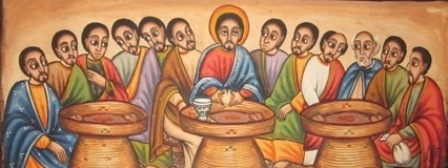 In a recent television interview a famous Muslim scholar said that ultimately there is only one sin and all others come from that sin. What would you name as the worst sin? He was quite clear that the greatest sin of all is forgefulness. According to him if we forget Allah (or for us, God) we forget who we are, what we are about and where we are going. We are like people wandering about without any goal in life, being blown this way and that by whatever prevailing wind blows – pleasure, drugs, money, etc.
In a recent television interview a famous Muslim scholar said that ultimately there is only one sin and all others come from that sin. What would you name as the worst sin? He was quite clear that the greatest sin of all is forgefulness. According to him if we forget Allah (or for us, God) we forget who we are, what we are about and where we are going. We are like people wandering about without any goal in life, being blown this way and that by whatever prevailing wind blows – pleasure, drugs, money, etc.




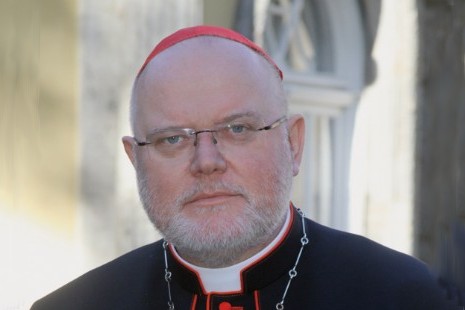


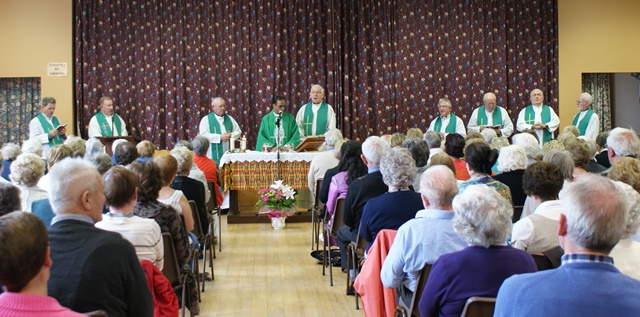
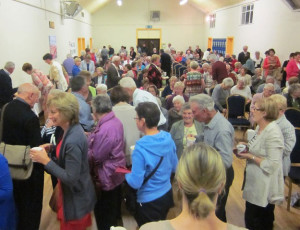
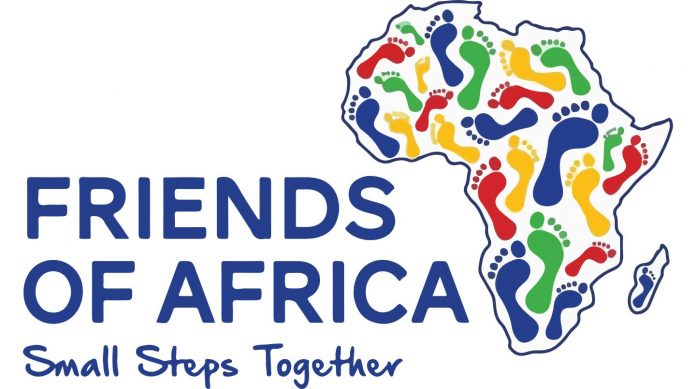
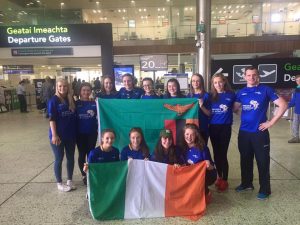
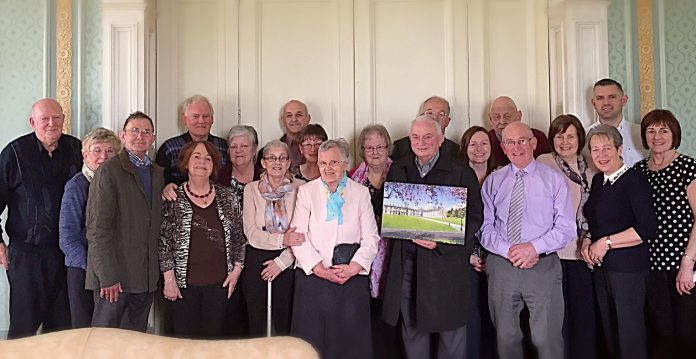
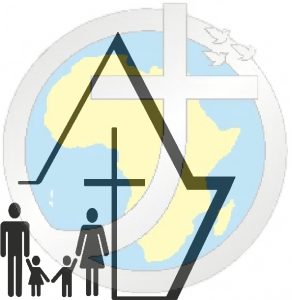
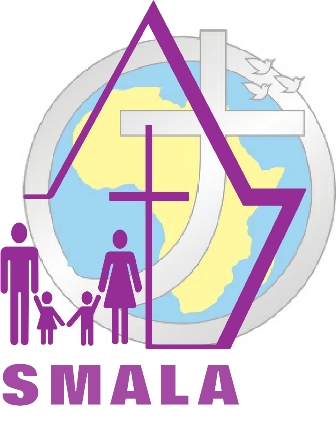
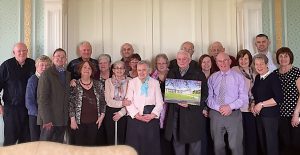
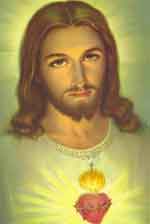

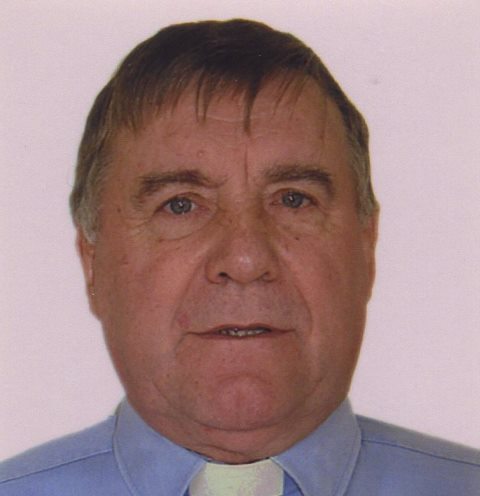









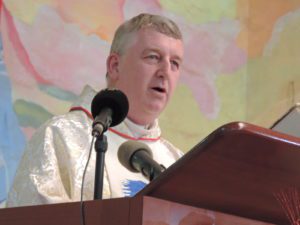

 We tend to take our modern gas and electric stoves and ovens for granted, but in many countries, homes have only kerosene or solid fuel cooking stoves, which can pollute household air. Each year, more than 4 million people die globally of complications from inhaling smoke from these stoves.
We tend to take our modern gas and electric stoves and ovens for granted, but in many countries, homes have only kerosene or solid fuel cooking stoves, which can pollute household air. Each year, more than 4 million people die globally of complications from inhaling smoke from these stoves. Several nations still rely heavily on pollution-producing cookstoves. Here are just a few of those countries with the following key:
Several nations still rely heavily on pollution-producing cookstoves. Here are just a few of those countries with the following key:
 At the end of the program we were very aware that we need the solidarity of like-minded people to take on the many challenges that the program highlighted. While the challenges are many, the hope that was nurtured during the program will sustain us as we live a life that sustains the planet, rather than undermining its life and vitality.
At the end of the program we were very aware that we need the solidarity of like-minded people to take on the many challenges that the program highlighted. While the challenges are many, the hope that was nurtured during the program will sustain us as we live a life that sustains the planet, rather than undermining its life and vitality.

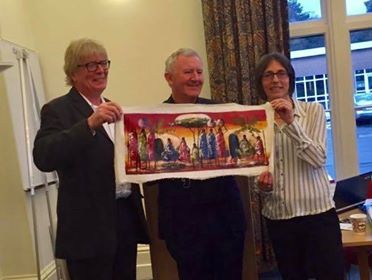











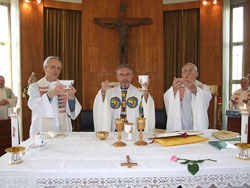
 that you’ve won a foreign lottery; opportunities to make easy money working from home. The list goes on.
that you’ve won a foreign lottery; opportunities to make easy money working from home. The list goes on. The BBC report also looks at efforts in conflict resolution concluding with an unusual compromise reached by a farmer who had cause to be furious with the herdsmen. Rotimi Williams, a rice farmer, had 49 acres of rice paddies destroyed in February by Fulani cattle and some of his farmhands were ready to go to war. However, Williams kept a cool head, rationalising, “We need a pragmatic approach where we learn to resolve conflicts with our neighbours.”
The BBC report also looks at efforts in conflict resolution concluding with an unusual compromise reached by a farmer who had cause to be furious with the herdsmen. Rotimi Williams, a rice farmer, had 49 acres of rice paddies destroyed in February by Fulani cattle and some of his farmhands were ready to go to war. However, Williams kept a cool head, rationalising, “We need a pragmatic approach where we learn to resolve conflicts with our neighbours.”

 The party that Mandela led to an overwhelming victory in 1994 and which has dominated South African politics since, the African National Congress (ANC) is now fighting to keep control of its traditional heartlands. Corruption, scandals and failure to keep promises and meet expectations has brought it to a point where South Africa’s local elections on 3 August 2016 will see it emerge battered and bruised by an increasingly disillusioned electorate in what are the most closely contested elections since white minority rule ended in 1994.
The party that Mandela led to an overwhelming victory in 1994 and which has dominated South African politics since, the African National Congress (ANC) is now fighting to keep control of its traditional heartlands. Corruption, scandals and failure to keep promises and meet expectations has brought it to a point where South Africa’s local elections on 3 August 2016 will see it emerge battered and bruised by an increasingly disillusioned electorate in what are the most closely contested elections since white minority rule ended in 1994.

 The SMA Summer School was dedicated to celebrating the 1st anniversary of Pope Francis’s Encyclical Laudato Si.
The SMA Summer School was dedicated to celebrating the 1st anniversary of Pope Francis’s Encyclical Laudato Si.










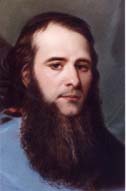

 Global Catholic Climate Movement Objectives:
Global Catholic Climate Movement Objectives: 

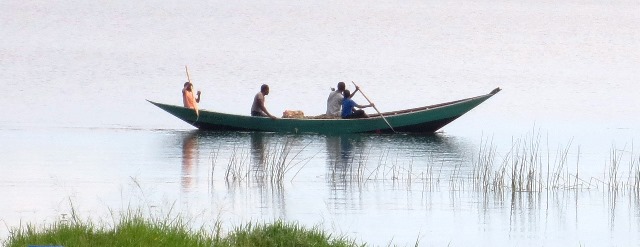



 Last Monday, 2 May 2016, the SMA Formation House in Nairobi celebrated the admission to Permanent membership in the Society of African Missions of Armand Mayumbu Maku (from the Democratic Republic of the Congo), Anicet M Agoli-Agbo (Benin Republic) and Luc Tougouma (Ivory Coast).
Last Monday, 2 May 2016, the SMA Formation House in Nairobi celebrated the admission to Permanent membership in the Society of African Missions of Armand Mayumbu Maku (from the Democratic Republic of the Congo), Anicet M Agoli-Agbo (Benin Republic) and Luc Tougouma (Ivory Coast).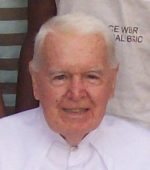
 In 1943 he moved to the African Missions College, Cloughballymore, Co. Galway to being in earnest his studies for the priesthood. It was a 21-month course in spiritual training and guidance at the end of which, 1 July 1945, he became a temporary member of the Society of African Missions. A classmate of his was the late Larry Mullen whose son, Larry Junior, is a member of the rock group, U2. In September, 1945, Jimmy began his theology studies at the SMA Major Seminary at Dromantine, Co. Down.
In 1943 he moved to the African Missions College, Cloughballymore, Co. Galway to being in earnest his studies for the priesthood. It was a 21-month course in spiritual training and guidance at the end of which, 1 July 1945, he became a temporary member of the Society of African Missions. A classmate of his was the late Larry Mullen whose son, Larry Junior, is a member of the rock group, U2. In September, 1945, Jimmy began his theology studies at the SMA Major Seminary at Dromantine, Co. Down. Around the same time a vacancy emerged at St. John Bosco’s, Ubiaja. It had also been closed down two years previously as a Teacher Training College and it was re-opened as a Commercial Secondary School under Fr. Paddy Gantly, SMA. ‘I went home on leave in June 1973 from St. John Bosco’s and fully expected to get appointed to parish work on my return.’
Around the same time a vacancy emerged at St. John Bosco’s, Ubiaja. It had also been closed down two years previously as a Teacher Training College and it was re-opened as a Commercial Secondary School under Fr. Paddy Gantly, SMA. ‘I went home on leave in June 1973 from St. John Bosco’s and fully expected to get appointed to parish work on my return.’  During his years in Nigeria, Fr Jimmy was also entrusted with Society responsibilities including representing his brother SMAs at the 1973 and 1983 Irish Provincial Assemblies and serving as Society Superior in Warri from 1983-1989.
During his years in Nigeria, Fr Jimmy was also entrusted with Society responsibilities including representing his brother SMAs at the 1973 and 1983 Irish Provincial Assemblies and serving as Society Superior in Warri from 1983-1989. Most of the above is taken from an Appreciation written by Fr Peter McCawille SMA on the occasion of Fr Jimmy’s 60th Ordination anniversary, in 2009, which was celebrated in St Patrick’s, Asaba. The quotations come from Fr Higgins two works [Kindling the Fire, The Pilgrim Soul in me] and Fr McCawille ended his Appreciation with the following lines, “We compliment Jim, on his youthful appearance, his gracious spirit and his perennial good humour. We rejoice with him on this special occasion and we extend to him our heartiest congratulations on reaching this momentous milestone in his life.”
Most of the above is taken from an Appreciation written by Fr Peter McCawille SMA on the occasion of Fr Jimmy’s 60th Ordination anniversary, in 2009, which was celebrated in St Patrick’s, Asaba. The quotations come from Fr Higgins two works [Kindling the Fire, The Pilgrim Soul in me] and Fr McCawille ended his Appreciation with the following lines, “We compliment Jim, on his youthful appearance, his gracious spirit and his perennial good humour. We rejoice with him on this special occasion and we extend to him our heartiest congratulations on reaching this momentous milestone in his life.” Through the heart that loved us,
Through the heart that loved us,
![Fathers Pius Afiabor [Regional Superior], Emmanuel Dim and Fidelis Atolagbe, all from Nigeria](http://www.sma.ie/wp-content/uploads/2016/03/SA-seminar-2.jpg)


 priests in appreciation for the Novena.
priests in appreciation for the Novena.




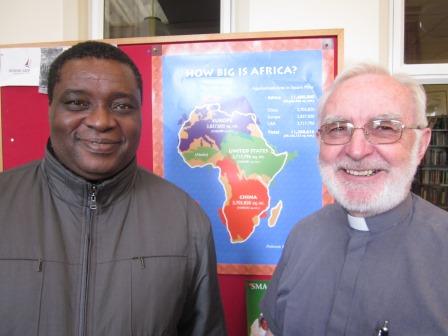

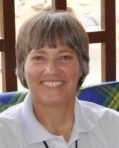

 During Advent 2015, St Joseph’s SMA Parish in Wilton, Cork participated in the Thumbprint exercise being championed by the SMA Justice group – making a mark for Climate Justice.
During Advent 2015, St Joseph’s SMA Parish in Wilton, Cork participated in the Thumbprint exercise being championed by the SMA Justice group – making a mark for Climate Justice. For three Sundays in Advent the Thumbprint Campaign was spoken about at all services. The congregation, including the Wilton SMA community, were encouraged to identify with the challenge of Climate Justice. Members were challenged to think deeper at a time when it was easy to be distracted by the commercialism of Christmas and it was also appropriate as the conference on Climate Justice was going on in Paris.
For three Sundays in Advent the Thumbprint Campaign was spoken about at all services. The congregation, including the Wilton SMA community, were encouraged to identify with the challenge of Climate Justice. Members were challenged to think deeper at a time when it was easy to be distracted by the commercialism of Christmas and it was also appropriate as the conference on Climate Justice was going on in Paris.










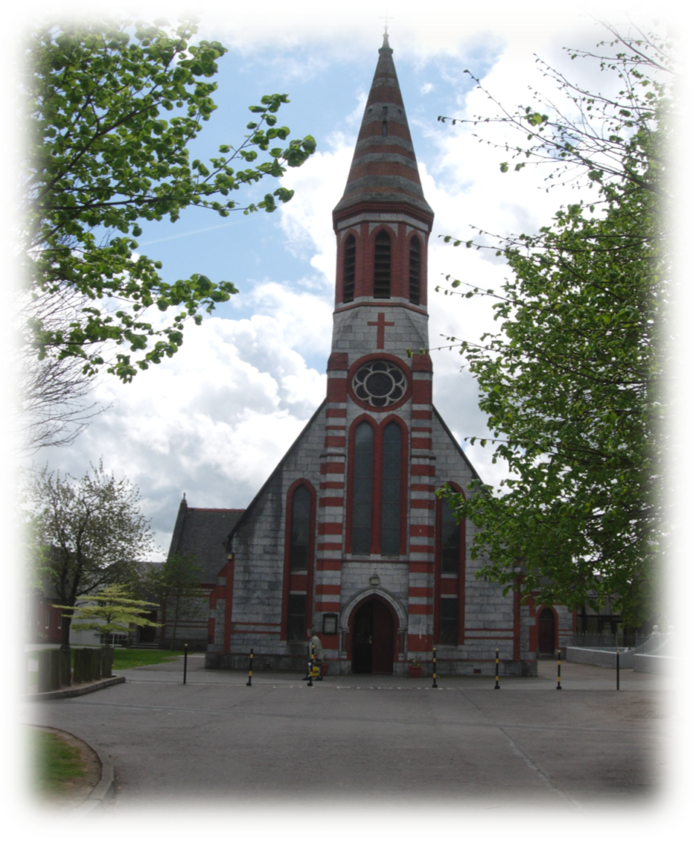

 CLIMATE CHANGE AND CLIMATE JUSTICE
CLIMATE CHANGE AND CLIMATE JUSTICE 























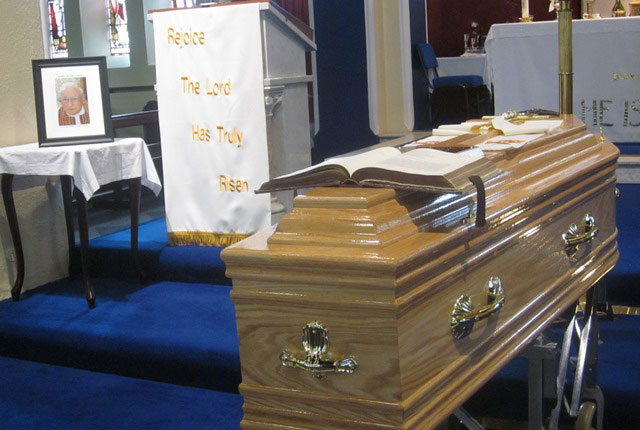
 The remains of Fr Bill Kennedy were removed from the SMA House to the adjacent St Joseph’s SMA Church, Wilton at 7pm on Tuesday, 19 May. Fr Dan Cashman SMA led the Prayers prior ot the removal. He paid tribute to Fr Bill in the following: “The meaning of the word ‘philosopher’ is a person who loves wisdom for its own sake. I think this is an apt description of Fr Bill Kennedy. He was a voracious reader, especially of works of spirituality and theology. He was a huge fan of the writings of Pope Benedict XIV. His mind was always searching for answers to our deepest questions about life.
The remains of Fr Bill Kennedy were removed from the SMA House to the adjacent St Joseph’s SMA Church, Wilton at 7pm on Tuesday, 19 May. Fr Dan Cashman SMA led the Prayers prior ot the removal. He paid tribute to Fr Bill in the following: “The meaning of the word ‘philosopher’ is a person who loves wisdom for its own sake. I think this is an apt description of Fr Bill Kennedy. He was a voracious reader, especially of works of spirituality and theology. He was a huge fan of the writings of Pope Benedict XIV. His mind was always searching for answers to our deepest questions about life. His spirituality was faith-filled and simple. He was a man of prayer and his love for the Eucharist nad Rosary was plain to see.
His spirituality was faith-filled and simple. He was a man of prayer and his love for the Eucharist nad Rosary was plain to see. The SMA Provincial Leader, Fr Michael McCabe, was the Principal celebrant for the Funeral Mass, assisted by Fr Leo Silke SMA [a classmate of Fr Bill], Fr Richard Wall SMA [former Regional Superior of MidWest Nigeria when Fr Bill was working there] and Fr Declan Blake [who worked with Fr Bill in the Finglas West parish, Dublin and is now PP of Ballymun parish]. More than 40 other SMA priests concelebrated as well as Frs Jim Barry [St Patrick’s Missionary Society – SPS], Paul Kenny [PP Dun Laoghaire] and Finbarr Crowley [PP Inishannon, Cork]. Fr Bill’s cousin, Fr Edward Downes was delayed but arrived shortly after the Mass began.
The SMA Provincial Leader, Fr Michael McCabe, was the Principal celebrant for the Funeral Mass, assisted by Fr Leo Silke SMA [a classmate of Fr Bill], Fr Richard Wall SMA [former Regional Superior of MidWest Nigeria when Fr Bill was working there] and Fr Declan Blake [who worked with Fr Bill in the Finglas West parish, Dublin and is now PP of Ballymun parish]. More than 40 other SMA priests concelebrated as well as Frs Jim Barry [St Patrick’s Missionary Society – SPS], Paul Kenny [PP Dun Laoghaire] and Finbarr Crowley [PP Inishannon, Cork]. Fr Bill’s cousin, Fr Edward Downes was delayed but arrived shortly after the Mass began. On behalf of the Irish Province of the SMA, I express my condolences to his sisters, Patricia and Angela; his brothers, Des and John; sister-in-law, Rosemary; nieces, nephews, cousins, relatives and friends. I welcome all who have travelled here today to pray for Fr Bill and pay him their last respects: Bill’s cousin, Fr Edward Downes and Fr Paul Kenny from Dublin, priests from the Diocese & Ross, Sisters, especially the members of the OLA, family members, relations and friends from Dublin.
On behalf of the Irish Province of the SMA, I express my condolences to his sisters, Patricia and Angela; his brothers, Des and John; sister-in-law, Rosemary; nieces, nephews, cousins, relatives and friends. I welcome all who have travelled here today to pray for Fr Bill and pay him their last respects: Bill’s cousin, Fr Edward Downes and Fr Paul Kenny from Dublin, priests from the Diocese & Ross, Sisters, especially the members of the OLA, family members, relations and friends from Dublin. tremendous help… History speaks for his heroics in Africa where he was SMA to the core and he left behind him a record that any man could be proud of and that set a high aim for those who followed. When home on leave he would stay with us and I have lovely memories of the Masses he celebrated in our home. We enjoyed his visits and great craic was had by all… Billy was no less generous to the rest of the family, to Angela, John and Desmond and prayed for us constantly.
tremendous help… History speaks for his heroics in Africa where he was SMA to the core and he left behind him a record that any man could be proud of and that set a high aim for those who followed. When home on leave he would stay with us and I have lovely memories of the Masses he celebrated in our home. We enjoyed his visits and great craic was had by all… Billy was no less generous to the rest of the family, to Angela, John and Desmond and prayed for us constantly. behalf of our family. Were this a military operation, you would all be recommended for the Victoria Cross. Billy so wanted to come home to Wilton to the staff and brother priests he loved and lived with for so many happy years. And he has done just that. From Billy I trust that I have inherited and become part of this lovely SMA family.
behalf of our family. Were this a military operation, you would all be recommended for the Victoria Cross. Billy so wanted to come home to Wilton to the staff and brother priests he loved and lived with for so many happy years. And he has done just that. From Billy I trust that I have inherited and become part of this lovely SMA family.
 When he completed Secondary School, Bill decided he wanted to become an SMA missionary priest like his uncle, Fr Jack, who was ordained in 1932 and ministered in Liberia until his untimely death in 1950 at the age of 48. When he was home on holidays from Liberia, Fr Jack used to visit Bill’s family in Dublin and it was to him that Bill expressed his wish to become an SMA priest. Fr Jack then mentioned this to his Bishop, John Collins, (a famous SMA missionary in Liberia) who took Bill out for tea in Barry’s Hotel in Dublin. In 1946, Bill entered the SMA Novitiate in Cloughballymore, Kilcolgan, Co Galway, where he also completed his Philosophy Studies. He took his First oath of membership in the Society in on 29 June 1948 and from there went to the African Missions Major seminary at Dromantine, Newry, Co Down where he completed his theological studies in 1952. After taking his oath of SMA Permanent membership [11 June 1951] he was ordained a priest in the Cathedral of St Patrick and St Colman, Newry, by Bishop Eugene O’Doherty on 18 June 1952. He was one of a class of twelve ordained that day.
When he completed Secondary School, Bill decided he wanted to become an SMA missionary priest like his uncle, Fr Jack, who was ordained in 1932 and ministered in Liberia until his untimely death in 1950 at the age of 48. When he was home on holidays from Liberia, Fr Jack used to visit Bill’s family in Dublin and it was to him that Bill expressed his wish to become an SMA priest. Fr Jack then mentioned this to his Bishop, John Collins, (a famous SMA missionary in Liberia) who took Bill out for tea in Barry’s Hotel in Dublin. In 1946, Bill entered the SMA Novitiate in Cloughballymore, Kilcolgan, Co Galway, where he also completed his Philosophy Studies. He took his First oath of membership in the Society in on 29 June 1948 and from there went to the African Missions Major seminary at Dromantine, Newry, Co Down where he completed his theological studies in 1952. After taking his oath of SMA Permanent membership [11 June 1951] he was ordained a priest in the Cathedral of St Patrick and St Colman, Newry, by Bishop Eugene O’Doherty on 18 June 1952. He was one of a class of twelve ordained that day. priestly life and ministry. On the occasion of his Golden Jubilee in 2002, Bill stated that Bishop Kelly was the single most important influence on him as a priest. Fr Bill worked in both the teaching and pastoral ministries and made a major contribution- particularly in the field of education – to the development of the Church in that Region in what was an era of remarkable growth
priestly life and ministry. On the occasion of his Golden Jubilee in 2002, Bill stated that Bishop Kelly was the single most important influence on him as a priest. Fr Bill worked in both the teaching and pastoral ministries and made a major contribution- particularly in the field of education – to the development of the Church in that Region in what was an era of remarkable growth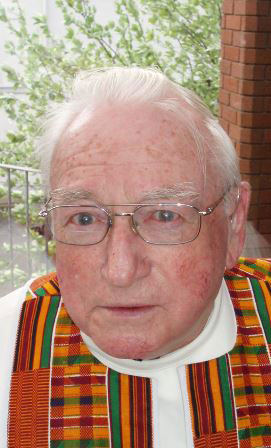
 “The one who had the greatest influence on me as a priest was Bishop Patrick J [PaJoe] Kelly SMA. He made me aware, by example, of the necessity of prayer in the priest’s life – a lesson I never ever forgot.” This is one of the memories of Fr Bill Kennedy SMA who died in Blackrock Road on Monday, 18 May 2015.
“The one who had the greatest influence on me as a priest was Bishop Patrick J [PaJoe] Kelly SMA. He made me aware, by example, of the necessity of prayer in the priest’s life – a lesson I never ever forgot.” This is one of the memories of Fr Bill Kennedy SMA who died in Blackrock Road on Monday, 18 May 2015.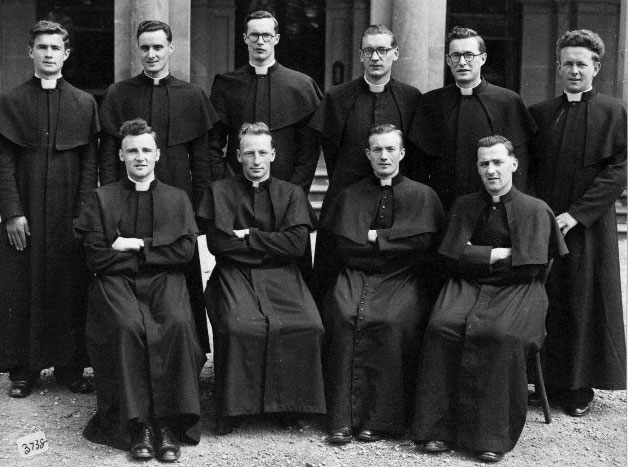
 The year after completing his Leaving Certificate exams, Bill began his Novitiate and Philosophy studies with the SMA in Cloughballymore, Kilcolgan, Co Galway. He took his First oath of membership in the Society in on 29 June 1948 and then transferred to the African Missions Major seminary at Dromantine, Newry, Co Down where he completed his theological studies in 1952.
The year after completing his Leaving Certificate exams, Bill began his Novitiate and Philosophy studies with the SMA in Cloughballymore, Kilcolgan, Co Galway. He took his First oath of membership in the Society in on 29 June 1948 and then transferred to the African Missions Major seminary at Dromantine, Newry, Co Down where he completed his theological studies in 1952.  Newry by Bishop Eugene O’Doherty on 18 June 1952, one of a class of ten ordained that day. He celebrated his First Mass on 19 June 1952 in the Church of Our Lady, Help of Christians, Navan Road, Dublin.
Newry by Bishop Eugene O’Doherty on 18 June 1952, one of a class of ten ordained that day. He celebrated his First Mass on 19 June 1952 in the Church of Our Lady, Help of Christians, Navan Road, Dublin. 
 Speaking of his years in Nigeria he said that the greatest joy he had was, during the Civil War period, “I was able to bring both material [food] and spiritual help to people. A frightening time but fruitful in being needed and able to really help.”
Speaking of his years in Nigeria he said that the greatest joy he had was, during the Civil War period, “I was able to bring both material [food] and spiritual help to people. A frightening time but fruitful in being needed and able to really help.” In 1993 the then SMA Superior General, Fr Patrick J Harrington, launched a project to seek vocations in Kenya and to establish an International House of Studies in Nairobi. Fr Thomas Hayden SMA (US Province) was appointed to lead the project and Fr Denis O’Sullivan (Cork) was put in charge of vocations.
In 1993 the then SMA Superior General, Fr Patrick J Harrington, launched a project to seek vocations in Kenya and to establish an International House of Studies in Nairobi. Fr Thomas Hayden SMA (US Province) was appointed to lead the project and Fr Denis O’Sullivan (Cork) was put in charge of vocations.
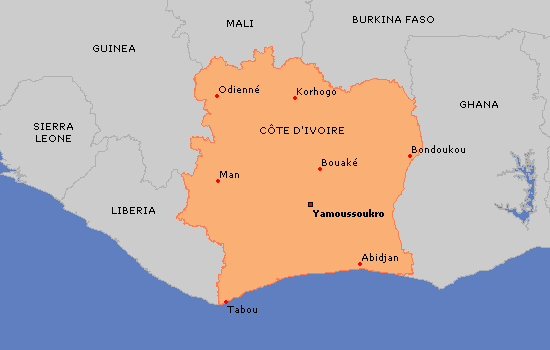
 On 8 April this year the people of Ivory Coast celebrated the 120th anniversary of the first SMA missionaries. The Thanksgiving Mass, led by Archbishop Joseph Spiteri [Apostolic Nuncio to the Ivory Coast], was celebrated in Abobo Doumé, on the outskirts of Abidjan, commercial capital of the country. It was also an occasion to celebrate the 10th and 40th Ordination anniversary of SMA Fathers Paulin Kouassi and Gino Sanavio respectively.
On 8 April this year the people of Ivory Coast celebrated the 120th anniversary of the first SMA missionaries. The Thanksgiving Mass, led by Archbishop Joseph Spiteri [Apostolic Nuncio to the Ivory Coast], was celebrated in Abobo Doumé, on the outskirts of Abidjan, commercial capital of the country. It was also an occasion to celebrate the 10th and 40th Ordination anniversary of SMA Fathers Paulin Kouassi and Gino Sanavio respectively.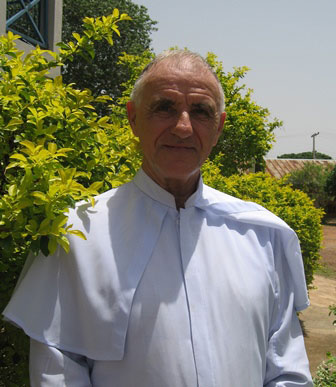
 Father Dan McCauley (SMA) is an Irish priest who will soon leave Nigeria after 44 years. He began his missionary work in Nigeria in 1971. In this interview, he speaks about those things that have impacted on him in the past four decades. His last Parish was in the Vicariate of Kontagora in Niger State.
Father Dan McCauley (SMA) is an Irish priest who will soon leave Nigeria after 44 years. He began his missionary work in Nigeria in 1971. In this interview, he speaks about those things that have impacted on him in the past four decades. His last Parish was in the Vicariate of Kontagora in Niger State.

 The Ordination of Bishop Bulus Yohanna as 2nd Vicar Apostolic of Kontagora, succeeding Bishop Tim Carroll SMA. Also in the photo are SMA Fathers Malachy Flanagan, Tim Cullinane and Billy Sheridan. This is a sure sign from the Lord that the work of the missionaries, local clergy and catechists is being blessed by the Lord.
The Ordination of Bishop Bulus Yohanna as 2nd Vicar Apostolic of Kontagora, succeeding Bishop Tim Carroll SMA. Also in the photo are SMA Fathers Malachy Flanagan, Tim Cullinane and Billy Sheridan. This is a sure sign from the Lord that the work of the missionaries, local clergy and catechists is being blessed by the Lord.